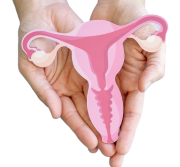Find out what's really going on in your uterus with IRIS
We are embarking on a journey of discovery to understand more about the uterus, and what uterine health means. We invite women interested in contributing to research to take part. Upcoming Verso Biosense clinical trials of the IRIS system will see us gather real time data on temperature and oxygen levels from within the uterus. We have clinical trials set up for women with normal menstrual cycles, and women undergoing IVF
Be part of the future of women's health
Clinical trials

The clinical trials are taking place in four UK locations under the supervision of gynecology consultants and their teams. The trial will provide data to support future women’s health treatment.
About You

Women between 18 and 42 are invited to participate in our clinical trials. By participating, you’ll be contributing much needed data that will improve our understanding about uterine health.
The Future

Diagnosis and treatment for some female-specific conditions could be greatly improved. At Verso Biosense, we want to revolutionise uterine health so women can make empowered decisions.
Download the digital poster

Centres enrolling in our clinical trials
Women with normal menstrual cycle
Women undergoing IVF
Women with normal menstrual cycle
The Beat, Axess Sexual Health-Liverpool
6 David Lewis Street, Liverpool, L1 4AP
0300 323 1300 Option 4
Contact Axess Study Teams on: axessresearch@liverpoolft.nhs.uk
The Arch, Axess Sexual Health-Knowsley
2 Ellison Grove, Huyton, L36 9GA
0300 323 1300 Option 3
Contact Axess Study Teams on: axessresearch@liverpoolft.nhs.uk
Clarewell Clinics- Birmingham
40 Hylton Street, Birmingham B18 6HN
https://clarewellclinics.co.uk/clinics/private-sexual-health-clinic-birmingham/
Contact Clarewell Clinics Study team on:
https://clarewellclinics.co.uk/research/iris-by-verso-biosense/
Clarewell Clinics- London
9 Ivor Place, London NW1 6BY
https://clarewellclinics.co.uk/clinics/private-sexual-health-clinic-london/
Contact Clarewell Clinics Study team on:
https://clarewellclinics.co.uk/research/iris-by-verso-biosense/
Clinical Research Centre
Blackpool Victoria Hospital
Blackpool Teaching Hospitals NHS Foundation Trust
Whinney Heys Road, Blackpool
FY3 8NR
Women undergoing IVF
London Women’s Clinic
115 Harley Street Marylebone, London W1G 6AP
Frequently Asked Questions
To find out if you are eligible to be enrolled in one of our clinical trials, you can contact one of the participating centres listed above.
The full name of the device is the IRIS system Intra Uterine Monitoring Device (IUMD), and there are two main parts:
• The IUMD (the “IRIS”): This is similar to an intrauterine contraceptive device (the coil) in shape, size and appearance. A trained healthcare professional will insert the IRIS device into the uterus via an inserter tube and rod – just like the copper IUD coil.
• The data receiver: a detachable, rechargeable reader which powers the device, communicating signals and retaining data. It is provided with an accompanying pair of form-fitting shorts (which you wear over your everyday underwear), and sits in a pocket on the outside of the garment.
There are no wires – the two parts connect wirelessly. A miniature system within the IRIS allows it to communicate with the data receiver, and to wirelessly collect energy.
A Radio Frequency Identification (RFID) system is used to communicate with the receiver and to transfer data. Readings take place every ten minutes for a duration of less than a minute, for seven days. The readings stored on the receiver are then processed and analysed by a health care professional (HCP).
As a monitoring device, the IRIS system is currently offered to all women interested in contributing to the research on uterine health as well as women who have problems conceiving.
The Iris measures both the oxygen concentration and temperature of the uterus – features considered to have an impact on uterine conditions and on embryo development. The objective of the study is to collect data that will enable clinicians to reference the parameters to uterine conditions.
While the device is designed to allow for as much of your regular daily activity as usual, sexual intercourse is not permitted in the context of the clinical study as it is important you do not become pregnant while using the device. In case you have sexual intercourse, it is recommended you use barrier contraception (condoms).
Monitoring oxygen and temperature levels in the uterus can help to create a complete picture of uterine health. Body temperature needs to be maintained within a narrow range for optimal enzyme activity and other cellular processes. Understanding the levels of these parameters and their relation to normal activities could potentially assist women to plan for children or to explain certain condition.
In addition to full support from the clinic team; once you are approved for the inclusion in the study, you will be given four pairs of shorts, the IRIS sensor (which will be inserted by a medical professional), two receivers , and a charger, in a package that will contain all information you need to understand the process.
We’ve designed the shorts (which are used to keep the receiver and power the IRIS device) to be form-fitting against your skin, to avoid discomfort whilst you’re continuing with your daily routine. They carry the receiver which sits in a built-in pocket on the outside of the shorts.
We will provide you with four pairs in your chosen size (choose from Small, Medium or Large). They’re made from the same material that you’d expect to find in sportswear and can be worn over your everyday underwear.
Yes – just remove the shorts as they shouldn’t be exposed to water. The IRIS must stay inserted while you go about your daily life.
The IRIS device is very similar to a traditional contraceptive coil in shape and method of insertion. The placement of the IRIS will be carried out by a consultant gynaecologist and should take between 5-10 minutes.
There might be some mild cramping once the IRIS has been placed, however you should be able to continue with your daily routine immediately.
Showering is perfectly fine, but please don’t immerse yourself in water while the device is inserted. Things like swimming or taking a bath may damage the device.
You should also refrain from overseas travel where it would be necessary to pass through airport scanners.
It is important to note that the IRIS system is not suitable for use with MRI scans and X-ray equipment.
Yes, with the exception of water-based activities where you are likely to be immersed in water, you may continue your regular exercise routine.
You are free to withdraw from the study at any time. If you decide not to continue with the study at any time, please contact your Nurse/Clinician team as soon as possible.
Do not attempt to remove the IRIS device yourself.
Your doctor will remove the device to facilitate as quick and easy a process as possible. Removal of the device is a simple outpatient procedure, and it will be organised as part of the clinical study.

